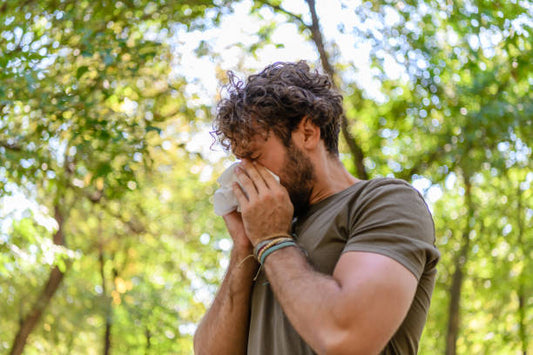Bacopa, also known as Brahmi, is a herb utilized frequently in Ayurvedic medicine to enhance brain performance and alleviate anxiety and tension. Studies indicate that Bacopa can enhance memory and focus, as well as lower anxiety and depressive symptoms. It is normally ingested as a supplement, although it can also be brewed as a tea. It is crucial to note, however, that more research is required to completely understand the benefits of Bacopa, and it is always advisable to see a healthcare practitioner before beginning a new supplement regimen.
Anxiety and stress are the two most prevalent mental health concerns affecting people today. Normal life might be impeded by symptoms such as restlessness, racing thoughts, quick heartbeat, and difficulty sleeping. These symptoms can have a significant impact on a person's quality of life and might be overpowering. Nonetheless, there is hope for those experiencing these symptoms. Bacopa, a natural plant, has been demonstrated to reduce anxiety and stress, making it a potentially life-altering treatment. In this post, we will examine the science behind Bacopa and how it helps treat anxiety and stress-related symptoms.
History
Bacopa, also known as Brahmi, has been used in Ayurvedic medicine for centuries. It is indigenous to India and has been used in traditional medicine for millennia to improve cognitive performance and reduce anxiety and tension. In ancient Ayurvedic literature such as the Charaka Samhita and the Sushruta Samhita, the herb is described as a brain tonic and memory booster. Bacopa has also been utilized in traditional Indian medicinal systems such as Siddha and Unani, in addition to Ayurvedic treatment.
Bacopa is frequently employed to enhance memory and cognitive function, as well as to alleviate anxiety and tension. It is believed to function by raising the amounts of neurotransmitters such as dopamine and serotonin in the brain. In recent years, numerous investigations on the possible advantages of Bacopa have revealed that it has favorable effects on memory, anxiety, and stress. However, additional research is required to properly comprehend Bacopa's effects.
How it works
The exact mechanism by which Bacopa exerts its effects is not yet well understood, but several theories have been proposed based on available research. Here are some of the ways Bacopa is thought to work:
-
Modulating neurotransmitter levels: Bacopa may increase the levels of neurotransmitters such as dopamine and serotonin in the brain, which are responsible for regulating emotions, memory, and cognitive function.
-
Improving blood flow to the brain: Bacopa may increase blood flow to the brain, which could result in improved cognitive function.
-
Antioxidant effect: Bacopa has been shown to have antioxidant properties, which may help protect the brain from damage caused by free radicals.
-
Promoting neurogenesis: Studies have indicated that Bacopa can stimulate the growth of new neurons in the hippocampus, which is a crucial brain region involved in learning and memory.
-
Regulating the HPA axis: Bacopa may decrease the activity of the hypothalamic-pituitary-adrenal (HPA) axis, which controls the body's stress response.
It's important to note that while these theories offer insight into how Bacopa may work, more research is needed to fully understand its mechanism of action. Additionally, individual results may vary, and it is always best to consult a healthcare professional before starting any new supplement or herb regimen.
Studies and Results
Several research have investigated the benefits of Bacopa on anxiety and stress reduction. In a double-blind, randomized, placebo-controlled research involving 60 participants, it was discovered that after 12 weeks of treatment, Bacopa dramatically reduced anxiety symptoms. The participants who received 300 mg of Bacopa extract daily reported a significant reduction in stress and anxiety compared to those in the placebo group.
After only six weeks of treatment, Bacopa considerably reduced stress symptoms in a separate research involving 40 participants. The participants in this study were given 225 mg of Bacopa extract per day, suggesting that smaller doses can also be beneficial in lowering stress.
It is crucial to remember that while Bacopa has been demonstrated to reduce anxiety and tension, individual outcomes may differ. Before beginning a new supplement regimen, it is advisable to consult a healthcare practitioner regarding the ideal dosage of Bacopa.
In conclusion, the research indicate that Bacopa may be an effective natural remedy for reducing anxiety and stress symptoms. It is an interesting alternative to conventional prescription medications because to its capacity to achieve big outcomes with minimum adverse effects. To evaluate the long-term effects of Bacopa, more research is required, but preliminary findings are encouraging for people seeking natural relief.
Recommended Dosage
The recommended dosage of Bacopa varies depending on the formulation and specific product. However, it is generally advised to consume between 300 and 450 mg of Bacopa extract every day. Before beginning a new supplement regimen, it is always suggested to see a healthcare expert. Bacopa pills normally take between 4 and 12 weeks to have an effect.
In addition, it is essential to remember that different studies have utilized varying doses of Bacopa extract. In some studies, as little as 50 mg per day was administered, whereas in others, as much as 300 mg per day was administered. Consultation with a healthcare practitioner is the best approach to find the correct dosage for you.
In addition, Bacopa supplements may interfere with some medications, such as blood thinners, therefore it is vital to see a healthcare expert before taking Bacopa if you are presently taking prescriptions.
Conclusion
Bacopa, also known as Brahmi, is a common plant used in Ayurvedic medicine to enhance brain performance and alleviate anxiety and tension. Studies indicate that Bacopa can enhance memory and focus, as well as lower anxiety and depressive symptoms. It is normally ingested as a supplement, although it can also be brewed as a tea. Before beginning a new supplement regimen, it is always advisable to visit a healthcare practitioner. The recommended daily dosage of Bacopa extract is normally 300-450 mg. Additionally, it is vital to highlight that additional research is required to completely comprehend the effects of Bacopa and to be mindful of possible drug interactions.
References
Pase MP, Kean J, Sarris J, Neale C, Scholey AB, Stough C. The cognitive-enhancing effects of Bacopa monnieri: a systematic review of randomized, controlled human clinical trials. J Altern Complement Med. 2014 Jul;20(7):647-52. doi: 10.1089/acm.2013.0180. PMID: 24500927.
Roodenrys S, Booth D, Bulzomi S, Phipps A, Micallef C, Smoker J. Chronic effects of Brahmi (Bacopa monnieri) on human memory. Neuropsychopharmacology. 2002 Aug;27(2):279-81. doi: 10.1016/S0893-133X(01)00419-5. PMID: 12135971.
Stough C, Lloyd J, Clarke J, Downey LA, Hutchison CW, Rodgers T, Nathan PJ. The chronic effects of an extract of Bacopa monniera (Brahmi) on cognitive function in healthy human subjects. Psychopharmacology (Berl). 2001 Aug;156(4):481-4. doi: 10.1007/s002130100815. PMID: 11479744.
Singh HK, Dhawan BN. Withania somnifera and Bacopa monnieri in cognitive and neuropsychiatric disorders. CNS Neurol Disord Drug Targets. 2009 Dec;8(6):403-17. doi: 10.2174/187152709789028932. PMID: 19923689.




